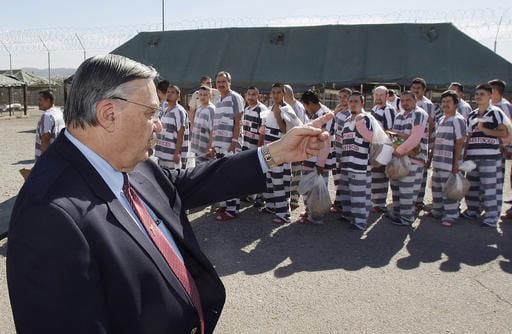PHOENIX — Maricopa County's new sheriff announced Tuesday that he's shutting down a complex of jail tents that helped make his predecessor, Joe Arpaio, a national law enforcement figure.
Paul Penzone said at a news conference that the nearly 24-year-old Tent City complex will be closing in 45 to 60 days.
Arpaio opened the complex in August 1993 as a way of easing jail overcrowding. The barbed-wire-surrounded compound was part of a broader campaign by Arpaio to enact get-tough measures in his jails, such as banning cigarettes, creating inmate chain gangs and dressing them in old-time striped prison uniforms.
Closing Tent City complex would undo a critical piece of Arpaio's six-term political legacy. Penzone, who defeated the 84-year-old Arpaio in November, is already phasing out his predecessor's practice of making inmates wear pink underwear.
The tents were popular among voters who believed jail is supposed to be a difficult place to live. There are no air conditioners in the tents to provide relief from Phoenix's triple-digit summertime heat, though inmates can pass the time in an air-conditioned room.
Critics said the complex was a way for Arpaio to garner media attention and contributed to a culture of cruelty within his jails.
Hundreds of inmates at Tent City rioted for several hours in November 1996, arming themselves with poles from their tents, setting fires and taking several jail officers hostage. In the end, eight sheriff's employees were injured, and the jail sustained about $130,000 in damages.
Arpaio touted the tents as a cost-saving measure, but the tents provided Arpaio with fodder for countless news releases and TV interviews over the years.
His office promoted celebrations for the upcoming anniversaries of Tent City and bragged in news releases that four presidential candidates had toured the tents and that a liberal magazine had deemed the complex one of the worst jails in America.
Arpaio posted a neon "vacancy" sign on an observation tower and another sign that said more than 500,000 people had spent time in the tents.
Tent City also was a fixture in Arpaio's stump speeches.
In a December 2009 address to an anti-illegal immigration group in Texas, Arpaio reflected on TV crews that came from across the world to shoot footage of Tent City. He said he came up with the idea of hanging a thermometer in Tent City so reporters could see he wasn't lying about the heat. Then he pointed out that the heat got more intense near the tops of the tents.
"Actually, there's a trick. If you go higher and hit the canvass, you gain about 20 degrees," Arpaio said, drawing laughter from the crowd when he explained that the ploy raised the temperature reading to 142 degrees.
Even though Arpaio insisted the complex was safe and run smoothly, Tent City was a regular target of criticism.
A jury awarded a $948,000 verdict in favor of Jeremy Flanders for a permanent brain damage he suffered in May 1996 when several hooded inmates pulled him from his Tent City bunk as he was sleeping, kicking and hitting him.
One witness said an inmate used a piece of steel rebar, which was used to secure the tents to the ground, to beat Flanders on the head, neck and shoulders.
A 2002 decision by the Arizona Court of Appeals in the Flanders case raised questions about the security of the complex, saying the flaps on the tents could be lifted up easily and that inmates freely roamed in and out of the tents.
The court also said fights among inmates were common and that inmates regularly got hold of banned items — cigarettes, lighters, fireworks, drugs, knives and food — that were sneaked into the complex by people who tossed them over the fences that surround Tent City.
In an interview with KTAR-FM two months ago, Penzone said a committee examining Tent City has discovered that the vast majority of inmates preferred to be incarcerated outdoors rather than being locked up behind the walls of conventional jail cells. Inmates at Tent City can move freely, have to report to their bunks only three times a day and can pass the time in a nearby air-conditioned room, Penzone said.
Russell Pearce, a former Arizona lawmaker who earlier in his career worked as Arpaio's top aide, has said he had proposed erecting tents as a cost-effective way of easing jail overcrowding, though Arpaio would ultimately take credit for the idea.





